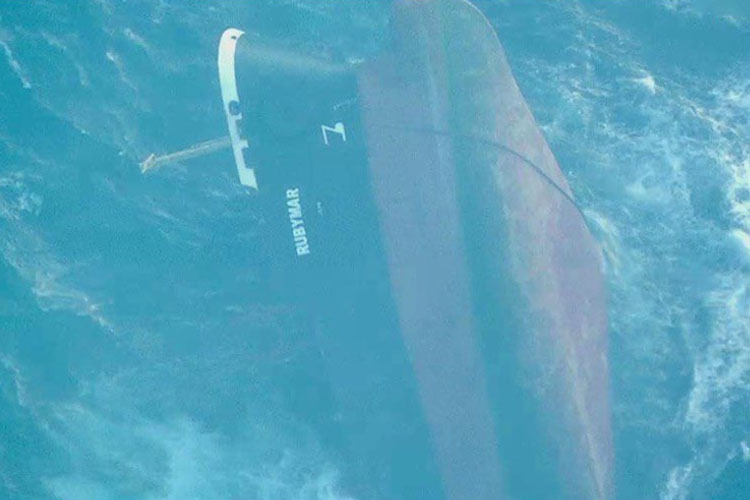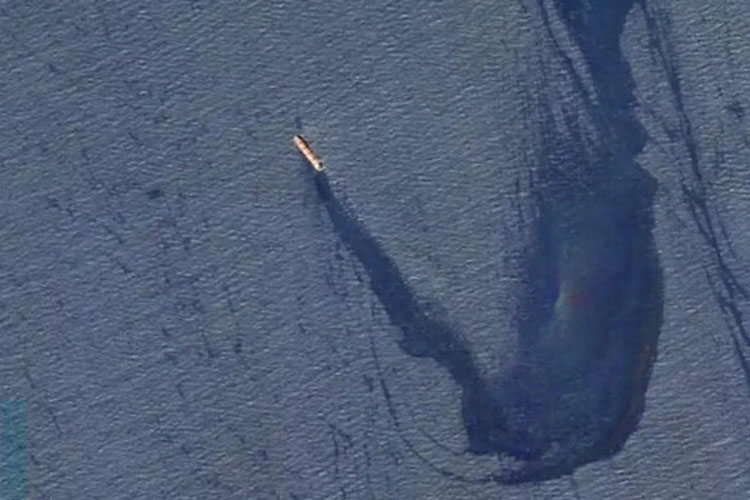
MV Rubymar, a UK-owned bulk carrier containing approximately 21,000 metric tonnes of ammonium phosphate sulphate fertiliser has sunk in the southern Red Sea, almost two weeks after being struck by a ballistic missile fired by Houthi rebels.
The 171m Belize-flagged Rubymar was struck on 18 February by one of two missiles as she passed through Bab el-Mandeb (‘Gate of Tears’), the narrow strait at the southern entrance to the Red Sea. The 24-man crew were safely evacuated to Djibouti, however, the vessel was disabled, leaking fuel and left to drift while slowly taking on water – leaving a 30km oil slick in its wake, according to reports.
In the early morning of 2 March, the waterlogged vessel eventually sank in shallow water, having drifted more than 70km northwards into the Red Sea.
US Central Command posted a picture of the stricken vessel on X, calling the news an ‘environmental risk’ to the Red Sea and a ‘subsurface impact risk’ to other ships passing through one of the busiest shipping lanes in the world.
Related articles:
- UN operation to remove oil from decaying Yemeni tanker
- Time is running out for decaying Yemeni tanker
- Pipeline diver tragedy ‘corporate manslaughter’ – report
- Red Sea’s Brothers Islands reopen for diving
The spillage of chemicals could have a long-lasting effect on the Red Sea’s marine ecosystems. Water exchange between the Red Sea and Indian Ocean through the Gulf of Aden is limited, as the strait at Bab el-Mandeb is just 26km wide at its narrowest point, with a maximum depth of around 300m.
The containment of water within the Red Sea is what, in part, gives rise to its increased salinity, clear water, and wealth of vibrant marine life, but it also means that the Rubymar’s spillage could be circulating through the Red Sea for months.
‘Without immediate action, this situation could escalate into a major environmental crisis,’ said Julien Jreissati, programme director at Greenpeace Middle East and North Africa (MENA).
‘As well as any further leaks of fuel oil from the engines, the sinking of the vessel could further breach the hull, allowing water to contact with the thousands of tons of fertilizer, which could then be released into the Red Sea and disrupt the balance of the marine ecosystems, triggering cascading effects throughout the food web.’

The Sinking of the Rubymar has been claimed by the Houthi militia as part of a campaign against Western shipping enterprise in revenge for Israel’s continued military action in Gaza. However, it is not the only time in recent history that regional conflict has posed a severe danger to the Red Sea’s ecosystems.
In 2023, the Floating Storage/Production (FSO) tanker Safer was finally salvaged after being abandoned for almost a decade, by which time the ship’s hull had decayed to a point whereby the 157,000 tonnes of crude oil remaining in its holds – four times the amount shed by the Exxon Valdez – were in danger of pouring into the Red Sea.
1.1 million barrels of oil were removed from FSO Safer in August 2023, however, recovery of the remaining residue has yet to be completed, as salvage operations have been suspended due to the continued Houthi violence.
- Survivors of Thai liveaboard DiveRACE Class E fire speak out – part 2 - 25 June 2025
- DIVE Magazine Summer 2025 preview - 23 June 2025
- Survivors of Thai liveaboard DiveRACE Class E fire speak out – part 1 - 19 June 2025



